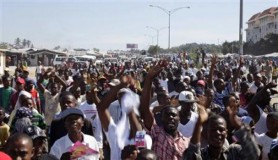PORT-AU-PRINCE, (Reuters) – Haiti’s elections ended in confusion today as 12 of the 18 presidential candidates denounced “massive fraud” and called for cancellation of the results as street protests erupted over voting irregularities.
The repudiation of the elections dealt a blow to the credibility of the U.N.-supported poll. The international community was hoping they could produce a stable, legitimate government in the poor earthquake-ravaged Caribbean country.

Voters’ frustration at not being able to cast their ballots due to organizational problems at many polling stations in the capital Port-au-Prince boiled over into street protests. At least one polling station was trashed by one angry group.
“We denounce a massive fraud that is occurring across the country. … We demand the cancellation pure and simple of the elections,” the 12 presidential candidates said in a joint statement read to reporters at a hotel in Port-au-Prince.
Still, Haiti’s Provisional Electoral Council (CEP) said the elections went “well” at most of the more than 11,000 polling stations across the nation. “The CEP is comfortable with the vote,” council president Gaillot Dorsainvil said.
Counting began after polls closed at 4 p.m. (2100 GMT).
The CEP acknowledged “some problems” and said it was trying to resolve them after the turbulent presidential and legislative elections went ahead amid a raging cholera epidemic and political tensions.
The 12 candidates denouncing the poll included all main opposition candidates, many of whom had already accused outgoing President Rene Preval’s Inite (Unity) coalition and its candidate Jules Celestin of trying to steal the elections.
Among them were prominent front-runners like former First Lady Mirlande Manigat, popular musician and entertainer Michel “Sweet Micky” Martelly, and lawyer Jean-Henry Ceant.
The U.N. mission in Haiti and the Organization of American States/Caribbean Community elections observer mission made no immediate comment on the fraud allegation.
Demonstrations flared in several parts of the sprawling capital, which still bears the scars of Haiti’s devastating Jan. 12 earthquake.
One protest of several thousand people in the Petionville district was led by Martelly, joined by Haitian-American hip-hop star Wyclef Jean, who was barred from standing in the presidential race by electoral officials in August.
Haitian radio stations reported two people killed in electoral violence in the south of the country, and one person injured when gunmen opened fire at a voting station at Fort Liberte in the northeast.
More than 12,000 U.N. troops and police assisted local police in protecting polling stations.
POLLING STATION WRECKED
Many voters spent hours under a hot sun desperately searching for the voting centers where their names were registered. Many polling stations opened late, mired in confusion and arguments over materials and observers.
In the Tabarre neighborhood, a group of voters who did not find their names on the electoral list wrecked a polling station set up in a school, strewing ballot boxes and ballots across the courtyard. Two Haitian policemen who were on guard there fled, witnesses said.
With political tensions flaring, and rebuilding after the January earthquake seemingly paralyzed by the advancing cholera epidemic, many feared a contentious election could drive Haiti deeper into turmoil.
At one polling center at the Delmas neighborhood in Port-au-Prince, which had still not begun operating hours after the official 6 a.m. (1100 GMT) opening time, several hundred protesting voters ran in the streets clamoring to be able to cast their ballots as armed U.N. police in riot gear stood by.
“People came to fulfill their right as citizens to vote, but up to now, no one has been able to,” said Joel Biteau, an observer from one of the political parties at the station.
Some voters did not have the national identity cards they needed to vote, others had their IDs but did not find their names on voter lists in the centers set up in schools, wooden huts and even in tents in crowded earthquake survivors’ camps.
University of San Francisco law professor Nicole Phillips told Reuters: “It’s more than confusion. People can’t find their names on the lists, they are holding their IDs, they are eligible to vote, but they can’t do it.”
Phillips, a staff attorney with the Institute for Justice and Democracy in Haiti, said the disorganization would further undermine the credibility of the elections, whose preparations were marked by sporadic violence and widespread skepticism.
RUN-OFF LIKELY
Manigat, Martelly, and Celestin, a government technocrat and protege of outgoing President Preval, had led the field of 18 presidential candidates, according to opinion polls.
But, even before today’s fraud denunciation, the lack of a clear favorite had increased the likelihood of the contest going to a Jan. 16 runoff between the two top vote-winners.
Calling 2010 the “worst year in Haiti’s history,” President Preval, who cannot run again after serving two terms, had called on Haitians to vote in peace and shun violence.
Violence, including ambushes of campaign caravans, random gunfire and attacks by rioters against Nepalese U.N. peacekeepers, whom some Haitians accuse of bringing in the cholera, killed several people in the run-up to the vote.
The United Nations says there is no conclusive evidence the Nepalese troops are the source of the disease outbreak.
Electoral observers and experts from the Organization of American States, the Caribbean Community, the association of Francophone states, the European Union and several European countries are in Haiti to observe and support the elections.




